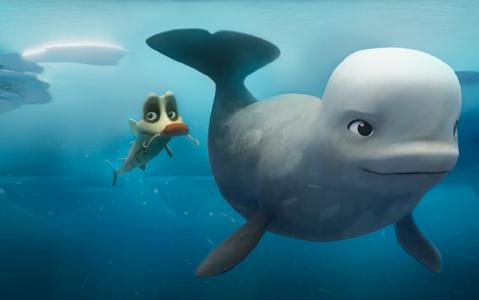
4 minute read
BlACK SlIDE
from ECFA Journal September 2022
by ECFA
Uri lotan about BlACK SlIDE
Advertisement
Together with a friend, Eviah sneaks into the water park and prepares for a scary ride on the ‘Black Slide’, the most terrifying ride in Aqua Fun. Queuing in line, the tension is rising. Later that day, a dramatic phone call will change Eviah’s life forever. The short animation BLACK SLIDE has a light-hearted design, but a dark shadow is hanging over all the colourful scenes. That is why Israeli filmmaker Uri Lotan speaks about “a film about childhood, death and adulthood.”
Uri Lotan: The film is based on a memory in which fun and tragedy got strongly entwined. As a kid I went with my friends to an aqua park. After I went into the water, I had the feeling that something had gone wrong, instinctively, so I went back home to my grandma who was taking care of us while my mother was sick. While preparing for a shower, I took the phone with me into the bathroom, as if I was expecting a phone call. Which came indeed, just like in the film. That tragic call was a monumental moment that got forever engraved in my mind. I was maybe too young to completely understand, but old enough to pick up a few hints and connect them in my mind.
That black slide is a frightening presence.
Lotan: I remember being a kid, queuing for any sort of scary thing like a water slide, you had to wait in line with adrenaline and fear building up slowly. There always was one friend who already had done it before, scaring you all the way. You knew that in the end inevitably you would go in, with no idea what to expect. Sometimes our imagination goes wild! Once inside things turn out not to be as dark and scary as Eviah expected them to be. The slide represents many things, like the experience of losing a beloved one, the white light people see through a near-death experience, or a notion of the transitoriness of all things.
Almost throughout the entire film, Eviah has a bleeding wound on his arm.
Lotan: The scar is a rather superficial symbol. Eviah is wounded, the scar is bleeding, but he uses his friend’s shirt to hide it – he pushes it away, much like he does in his reality back home. There are certain things that he knows but rather would not like to know, so he denies them. One of the tricky parts of the film was the timeline being rather unclear: what happens in the present, the past, or the future? The wound helps us to establish an actual timeline; in my mind the trip to the water park takes place in the morning, and he gets home – wounded – in the evening.
How do the animated aesthetics fit the story?
Lotan: The main intention is to give a better understanding of Eviah’s inner journey. This is a story about crossing the border between childhood and adulthood, an idea that I liked to see aesthetically represented in the film, combining rather childish, playful elements with a deeper understanding of life. That is the process Eviah is going through; he is still a kid, but after this experience he will have a slightly more adult outlook on things. Moreover, the part inside the slide allowed me some extra fun as an animator. Because that is what I am, and how I think and communicate.
Q&A at the Olympia Film Festival

ECFA Journal Published by ECFA European Children’s Film Association Place de l’Amitié 6, 1160 Brussels, Belgium
Phone: +32 475 55 02 97 Email: mail@ecfaweb.org Website: www.ecfaweb.org
Please send press releases, advertisements, questions & information to: Gert Hermans, journal@ecfaweb.org
ECFA’s goal is to support cinema for children and youth in its cultural, economical, aesthetic, social, political and educational aspects. Since 1988 ECFA brings together a wide range of European film professionals and associations, producers, directors, distributors. ECFA aims to set up a working structure in every European country for films for children and young people, a structure adapted to Europe’s multicultural interests.
For more information and memberships (€ 250 per year): ECFA European Children’s Film Association Phone: +32 (0)475 55 02 97 Email: mail@ecfaweb.org Website: www.ecfaweb.org
The European Children’s Film Distribution Network: www.ecfaweb.org/european-childrens-film-network/network Databases on children’s film festivals, sales agents, distributors and TV-programmers interested in European films for children. ECFA Journal No. 3-2022
Contributors to this issue:
Gert Hermans (Editor) Reinhold Schöffel, Felix Vanginderhuysen, Margret Albers, Gudrun Sommer, Xiaojuan Zhou, Uta Beth, Marija Ratković Vidaković, Linda Teutrine, Kevin De Ridder, Pantelis Panteloglou, Lucie Mikelová, Jaroslava Hynštová, Marketa Pasmova, Maja Popovic, Andrey Hadjivasilev, Volodymyr Diagilev, Camilla Böttinger, Karolina Śmigiel, Frederik Norgaard, Míla Řádová, Renate Zylla.
Proofreading: Adam Graham Design: Stefan Koeneke ECFA website: Udo Lange










